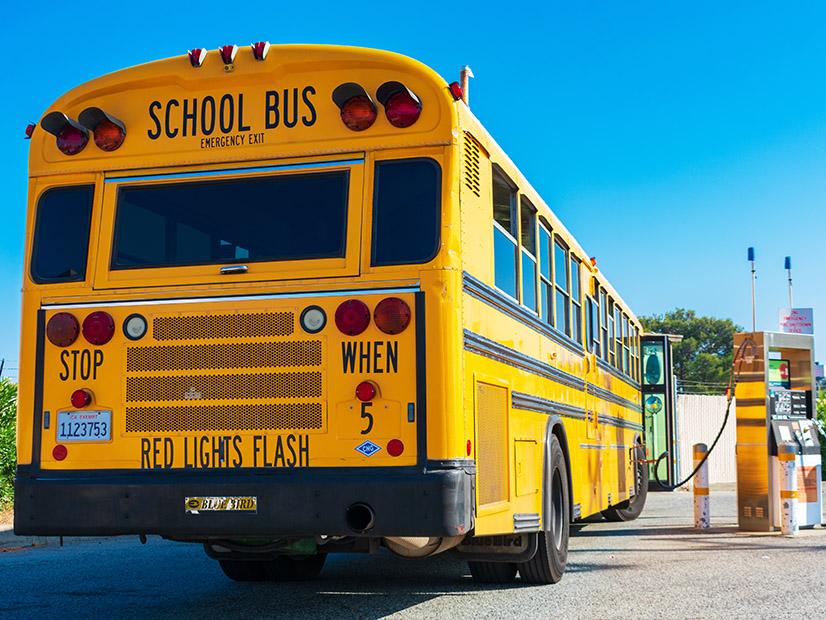Virginia Gov. Ralph Northam (D) announced Thursday that 83 aging diesel school buses across the state will soon be replaced with zero- or low-carbon vehicles, which will reduce the state’s greenhouse gas emissions by an estimated 10,000 tons per year.
The 39 electric buses and 44 propane vehicles going to 19 districts will be paid for with $10.5 million from Virginia’s share of the Volkswagen Environmental Trust Fund, the settlement the German automaker made for its fraudulent reporting of emissions from its vehicles in violation of the U.S. Clean Air Act. Virginia’s Department of Environmental Quality (DEQ) administers the state’s $93.6 million share of the trust to reduce air pollution in the state.
“We all benefit from transitioning away from diesel school buses and investing in clean alternatives for our transportation system,” Northam said. “I know how important clean air is for children’s health.”
In addition to the emission reductions, the replacements will also “save one million gallons of diesel fuel, equivalent to removing 2,000 cars from the road,” said DEQ Director David Paylor.
The largest of the announced grants, $2.65 million for 10 electric buses, is going to Fairfax County, a populous jurisdiction in the Washington, D.C., suburbs. The smallest grant, $26,800 for four propane buses, is going to Norfolk City in the state’s southeastern corner. The $10.5 million total is a little more than half of the $20 million bus replacement program that Northam announced in 2019.
As in many other states, transportation is the largest source of greenhouse gas emissions in Virginia — accounting for more than 40% of emissions — which makes the sector a focus for Northam’s clean energy efforts. Under the 2020 Virginia Clean Economy Act (VCEA), the state is targeting zero carbon emissions from electricity generation by 2050, and Terry McAuliffe, the Democratic candidate for governor in the upcoming November election, is pledging to push that timeline up to 2035.
However, as of 2018, annual carbon dioxide emissions in the state averaged more than 12 metric tons per capita, according to the Weldon Cooper Center for Public Service at the University of Virginia.
Propane vs. Electric
School districts across the country are looking at alternatives to their often-aging diesel buses and evaluating the pros and cons of electric versus propane-powered vehicles.
Electric vehicles offer zero-emission and lower maintenance and operating costs, but at a higher upfront cost than propane buses, which produce lower GHG emissions than diesel, as well as lower nitrogen oxide (NOx) and sulfur oxide (SOx) emissions. At present, propane buses also beat electric on range, with some school district officials saying their propane vehicles travel about 400 miles per tank versus about 100-150 miles for electric.
The cost factor is significant. For example, Albemarle County will buy two electric buses with its $530,000 grant, while rural Halifax County will be able to buy 10 propane buses with a grant of $79,820.
“Many of our families struggle to make ends meet,” said Tammy Lacks Moore, the county’s public school director of transportation. “These funds will enable us to replace 10 diesel buses without raising taxes on our already burdened population, all while making sure we are doing everything we can to help improve our community.”
Other counties that will be replacing diesel buses with propane include Chesterfield County just outside the state capital of Richmond, Newport News, Norfolk City and Virginia Beach City.
Range was a big consideration earlier this year, as the Virginia General Assembly debated a bill (HB 2118) that would have established a fund to help districts transition to electric buses, but only if the state received federal or other non-state dollars to pay for the program. The bill passed the House but stalled in the Senate.
At that time, school district officials in the hillier counties said replacing diesel buses with electric ones would be unrealistic for them, citing a list of potential problems, including battery life, charging station challenges and cost.
“Electric buses simply would not be workable in this area,” said Tim Edwards, director of transportation for Scott County Schools, in the Blue Ridge Mountains. “Scott County’s terrain is too hilly, mountainous.”
Ben Truett, head of transportation for Alleghany County Schools, agreed that electric buses “would work in cities, because of their flat terrain, but not in the mountain areas” of Virginia. “The batteries do not have enough range or power.”
The leading electric bus maker, High Point, N.C.-based Thomas Built Buses, averages 134 miles on a fully charged 220-kWh battery. Some bus routes in Alleghany and Scott counties are more than 100 miles round trip, the directors said. Given the power needed to climb steep hills, they doubt a fully charged battery would last an entire trip. Both counties run buses that get about 360 miles to a 100-gallon tank, with most requiring a top off several times a week.
Electric bus manufacturers are working on vehicles with longer ranges. For example, U.S. manufacturer Proterra is now offering electric buses that, the company says, can go 221-329 miles on a single charge.
The districts opting for electric buses pointed to their environmental benefits and operational efficiencies.
“We are, quite simply, thrilled with the award of two electric buses to Falls Church City Public Schools,” Superintendent Peter Noonan told NetZero Insider. “Environmental sustainability and resilience are core values of our community.”
Tracy Seitz, superintendent of the Middlesex County Public Schools, said her district already has two electric school buses. The two additional vehicles will double the fleet so “we can proudly say that 20% of our operating fleet is fully electric.
“MCPS has no intention of stopping at 20%,” Seitz said. “We recognize the importance of reducing carbon pollution to our environment and also providing a healthy and efficient method of transporting our students.”



